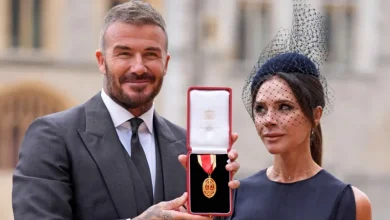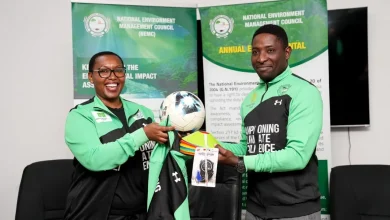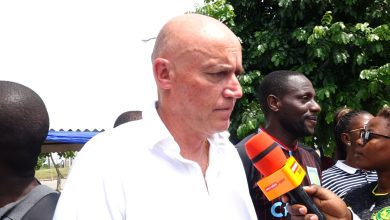Julio’s shout, Mgunda’s clap, Morocco’s roar: Tanzania’s blindfolded dream team

DAR ES SALAAM: IT was the sort of night when you wish the floodlights would blow out, the referee would abandon the game, and the crowd would be refunded with free crates of Safari Lager instead of ninety minutes of national embarrassment.
One–nil down to Niger, in our own backyard and the noise wasn’t the triumphant roar of Taifa Stars fans but the dull groan of resignation.
Only days earlier we had stumbled to a 1-1 draw away to Congo Brazzaville in Brazzaville….
That should have set alarm bells ringing. Now the bell had become a siren.
And yet, as the final whistle shrieked, somebody in the VIP box was already thinking about which singeli star to book for the next pre match concert.
That, in a nutshell, is Tanzanian football’s tragedy: when we say long-term planning, we mean whether Harmonize or Diamond should come on before kick off.
You almost feel nostalgic for the days when football here was treated as a craft rather than a carnival.
There was a time when our leaders decided, sensibly, that if you wanted better football, you should actually educate coaches.
Imagine that! In the 1970s and 80s, Joel Nkaya Bendera, Raymond “Ray” Gama, Paul West Gwivaha, Shaaban Marijani and Elijah Kategile were dispatched to West Germany.
Not for shopping trips or photo ops, but for multi-year coaching courses in places like Leipzig and Cologne.
There, Germans with clipboards thicker than phone directories taught them about tactics, fitness, psychology and pressing systems.
And why kicking the ball aimlessly into the clouds was not a strategy.
They came back with diplomas, knowledge and a sense that Tanzania could actually join Africa’s football conversation.
And for a brief, golden moment, it worked.
In 1980 we qualified for the Africa Cup of Nations for the first time.
Simba reached the semi-finals of the African Champions Cup in 1974, for the first time.
These weren’t flukes. They were the fruits of watering the roots.
Fast forward to today and the irony is more painful than a late tackle on a muddy Tabora pitch.
Wallace Karia, President of the Tanzania Football Federation, smiles for the cameras and assures us of plans, blueprints, committees.
Professor Palamagamba Aidan Mwaluko Kabudi, the Minister of Culture, Arts and Sports, cuts ribbons at stadiums with all the flair of a wedding MC and promises a revolution in sports infrastructure.
Dr Damas Ndumbaro before him gave grand speeches about a new dawn for Tanzanian football.
The speeches change, the ties change, the faces at the podium change, but the football remains the same old script: gallant promises, galling results.
When we lose, the excuses come faster than substitutions in the 85th minute. The referee was biased. The pitch was poor. The players were tired.
Never that maybe, just maybe, we stopped investing in coaches four decades ago and replaced strategy with showbiz.
Meanwhile, elsewhere on the continent, others have quietly stolen a march.
Morocco didn’t just turn up at the 2022 World Cup and fluke their way to the semi-finals.
They built the Mohammed VI Academy, pumped millions into coaching and youth development and demanded their coaches match UEFA standards.
Cape Verde, an archipelago better known for fish than football, professionalised its coaching pathways and became an AFCON quarterfinalist with swagger.
Madagascar, the land of vanilla, shocked the continent in 2019 by storming the AFCON quarters, powered not by DJs but by coaches who knew what they were doing.
And us? We are still debating whether the half time act should be a bongo flava singer or a singeli A lister.
Even the big clubs have caught the short-term fever.
Hersi Said of Yanga SC runs continental campaigns with gusto, but too often the academy system is treated like an afterthought com pared to slick Instagram reels.
Salim Abdallah, better known as “Try Again” at Simba SC, throws his heart into CAF competitions, but Simba’s youth production line has more gaps than an old Kariakoo pavement.
It’s not that these men don’t care; they care passionately. It’s just that their focus is as short-lived as a halftime singeli beat.
Results must come instantly; foreign coaches are hired and fired like DJs at a noisy wedding and the grind of building coaching expertise is politely ignored.
And when a coach dares to introduce European-style order, he is chased out faster than a referee who dares whistle a penalty against Simba or Yanga at Benjamin Mkapa Stadium.
Remember Ammy Linje? He dared to talk about tactical systems, structure, player discipline, nutrition, the boring stuff that wins football matches.
The verdict? “Ahh…. analeta uzungu sana.” Too European, too rigid, not Tanzanian enough.
Out he went and in marched the cult heroes.
Mohamed Morocco, all chest-thumping charisma. Jamhuri “Julio” Kihwelu, whose voice alone could rattle goalposts.
Juma Mgunda, Simba’s emergency firefighter, beloved for his no-nonsense clap-and-pray approach.
None of them spent three years studying in Leipzig. None of them wrote essays on Gege pressing. But to the faithful, they could beat any side blindfolded.
We don’t need diplomas, we have passion, they say. And so, the cycle of entertainment over education spins on.
What makes the whole affair even more tragicomic is that we know better.
Joel Bendera’s famous 5–0 comeback away win against Mufulira Wanderers in Zambia wasn’t conjured out of thin air; it was built on lessons learned in Germany.
Ray Gama’s stint as national coach was earned the hard way, through years of study abroad.
Elijah Kategile, less celebrated but vital, returned with knowledge that fed into our only AFCON qualification.
These were men who showed us the value of watering roots.
But watering roots is dull. Flashy shows are exciting. Guess which one our leaders prefer?
So, ask yourself: why is it easier in Tanzania to secure permits for a pre-match con cert than to organise a CAF A licence course for ten coaches?
Why are we spending more on fireworks than on scholarships?
Why does TFF roll out carpets for celebrity guests but not long-term development plans?
The truth is embarrassing.
Somewhere along the way, the people in charge decided football is theatre, not a process.
As long as the crowd is entertained, results can wait. For a while, perhaps, that works.
Tanzanians love a good party.
But eventually, even the loudest singeli bassline cannot drown out the sound of another ball thudding into the back of our net.
Oh, yes, there are some signs of progress.
Nasra Juma, the first Tanzanian woman with a CAF B licence, is a beacon.
Ammy Ninje holds a UEFA A license and works in FIFA programmes.
Emanuel Saakai is on his way to UEFA A status abroad.
Nsanganzelu brought lessons from Leipzig to our national team setup.
These are bright sparks. But they all are isolated personal victories, achieved in spite of the system, not because of it.
The federation applauds, takes pictures, posts on Twitter, then gets back to organising the next halftime concert.
What we need is obvious, boring and urgent.
More scholarships for coaches, more investment in grassroots, more stubborn patience.
Wallace Karia should be signing agreements with German and Scottish academies, not event managers.
Prof Kabudi should be fighting for budgets that fund youth development, not another glitzy stadium renovation.
Hersi Said and Try Again should pour money into academies that can produce the next Mbwana Samatta, not just Simba Day and Wiki ya Wananchi bonanzas.
It isn’t glamorous, but it works. Morocco knows it. Cape Verde knows it. Even Madagascar knows it.
Only we, with our drumbeats and DJ booths, seem allergic to the idea.
Football is cruel to those who treat it as theatre. You can fill the terraces, pump the music, fire the fireworks. But when the whistle blows, only football matters.
Without foundations, the façade crumbles. Niger proved it and Niger will not be the last.
Until we rediscover the patient wisdom of sending coaches abroad, of taking education seriously, we will remain the continent’s court jesters, good for a laugh but never for a trophy.
So, picture the scene in 2030.
Tanzania face Cape Verde in a World Cup qualifier. The Moroccans and Cape Verdeans are tapping tab lets, fine-tuning pressing schemes.
Our side? The halftime act is already trending on TikTok. Wallace Karia is smiling.
Prof Palamagamba is promising yet another renaissance. Hersi is updating Instagram. Try Again is leading the chants.
Mohamed Morocco is roaring, Julio is threatening to burst a vein, Mgunda is clapping furiously.
The stadium shakes with noise. The night is electric. The scoreboard reads Tanzania 0, Cape Verde 3.
The crowd is entertained. The world is unmoved. And the only silverware we lift, once again, is the DJ’s microphone.





